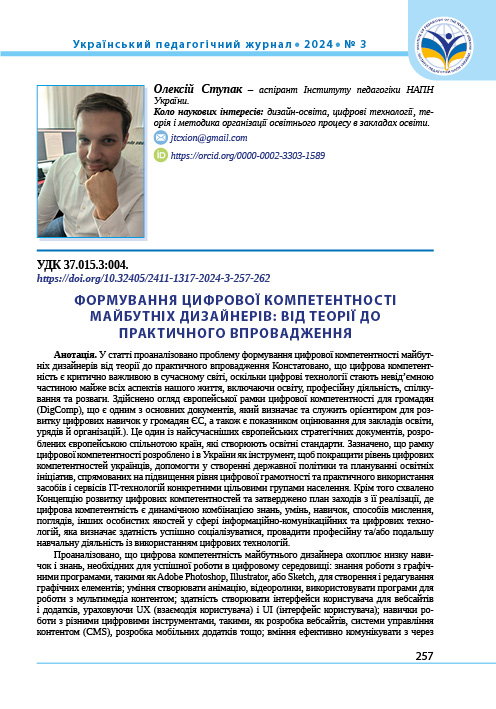Abstract
The article analyzes the problem of forming the digital competence of future designers from theory to practical implementation. It is stated that digital competence is critical in the modern world, as digital technologies are becoming an integral part of almost all aspects of our lives, including education, professional activities, communication and entertainment. The European Digital Competence Framework for Citizens (DigComp), which is one of the main documents that defines and serves as a benchmark for the development of digital skills in EU citizens, as well as an assessment indicator for educational institutions, governments and organizations, is reviewed. It is one of the most modern European strategic documents developed by the European community of countries that create educational standards. It is noted that the Digital Competence Framework has also been developed in Ukraine as a tool to improve the level of digital competence of Ukrainians, to help create public policy and plan educational initiatives aimed at increasing the level of digital literacy and the practical use of IT tools and services by specific target groups. In addition, the Concept of Digital Competence Development and an action plan for its implementation were approved, where digital competence is a dynamic combination of knowledge, skills, abilities, ways of thinking, attitudes, and other personal qualities in the field of information, communication, and digital technologies that determines the ability to successfully socialize, conduct professional and/or further educational activities using digital technologies.
It is analyzed that the digital competence of a future designer covers a number of skills and knowledge necessary for successful work in the digital environment: knowledge of working with graphic programs such as Adobe Photoshop, Illustrator, or Sketch to create and edit graphic elements; ability to create animation, videos, use programs to work with multimedia content; ability to create user interfaces for websites and applications, taking into account UX (user experience) and UI (user interface); skills in working with various digital tools, such as website development, content management systems (CMS), mobile application development, etc.; ability to communicate effectively through digital channels, such as email, chats, video conferencing; ability to generate ideas, develop concepts and analyze design effectiveness using analytics and metrics. The possibilities of using digital technologies (2D and 3D animation, VR and AR technologies), which make changes in all areas of designers’ activities, are highlighted.
It is generalized that modern technologies and teaching methods ensure the training of highly qualified specialists capable of working in a rapidly changing digital world. It is imperative to develop methods for continuous monitoring and evaluation of the effectiveness of educational programs for the formation of digital competence, which will make it possible to make the necessary adjustments to improve the quality of education and expand opportunities.
References
Алєксєєва, С. (2023a) Цифрова компетентність: змістові домінанти та тенденції. Перспективи та інновації науки (Серія «Педагогіка»), 9(27), 70‒78. https://doi.org/10.52058/2786-4952-2023-9(27)-70-78
Алєксєєва, С. (2023b) Цифрова компетентність: стратегічні орієнтири та успішні практики. Перспективи та інновації науки (Серія «Педагогіка»), 10(28), 45‒55. https://doi.org/10.52058/2786-4952-2023-10(28)-45-55
Арістова, Н. (2023) Формування цифрової компетентності студентів філологічних спеціальностей: інтерактивні форми організації і методи навчання. Освіта. Інноватика. Практика, 11(6), 6–12. https://doi.org/10.31110/2616-650X-vol11i6-001
Кабінет Міністрів України. (2021). Про схвалення Концепції розвитку цифрових компетентностей (від 3 березня 2021 р. № 167-р) https://zakon.rada.gov.ua/laws/show/167-2021-%D1%80#n13
Топузов, О., Алєксєєва, С. (2024). Можливості використання штучного інтелекту в освітньому процесі закладів середньої освіти в умовах воєнного стану. Український Педагогічний журнал, (1), 5–11. https://doi.org/10.32405/2411-1317-2024-1-5-11
Carretero, S., Vuorikari, R., Punie, Y. (2017). DigComp 2.1: The Digital Competence Framework for Citizens with eight proficiency levels and examples of use. Luxembourg: Publications Office of the European Union.
Malykhin, O., Aristova, N., & Alieksieieva, S. (2022). Boosting Lifelong Learning for General Secondary Schoolteachers: Digital Competence Development Amid Blended Learning. Society. Integration. Education. Proceedings of the International Scientific Conference, 1, 819–827. https://doi.org/10.17770/sie2022vol1.685
Vuorikari, R., Punie, Y., Carretero Gomez S., Vanden Brande, G. (2016). DigComp 2.0: The Digital Competence Framework for Citizens. Update Phase 1: The Conceptual Reference Model. Luxembourg Publication Office of the European Union. doi:10.2791/11517/ 44 p.
Alieksieieva, S. (2023a) Tsyfrova kompetentnist: zmistovi dominanty ta tendentsii. Perspektyvy ta innovatsii nauky (Seriia «Pedahohika»), 9(27), 70‒78. https://doi.org/10.52058/2786-4952-2023-9(27)-70-78 (in Ukrainian).
Alieksieieva, S. (2023b) Tsyfrova kompetentnist: stratehichni oriientyry ta uspishni praktyky. Perspektyvy ta innovatsii nauky (Seriia «Pedahohika»), 10(28), 45‒55. https://doi.org/10.52058/2786-4952-2023-10(28)-45-55 (in Ukrainian).
Aristova, N. (2023) Formuvannia tsyfrovoi kompetentnosti studentiv filolohichnykh spetsialnostei: interaktyvni formy orhanizatsii i metody navchannia. Osvita. Innovatyka. Praktyka, 11(6), 6–12. https://doi.org/10.31110/2616-650X-vol11i6-001 (in Ukrainian).
Kabinet Ministriv Ukrainy. (2021). Pro skhvalennia Kontseptsii rozvytku tsyfrovykh kompetentnostei (vid 3 bereznia 2021 r. № 167-r) https://zakon.rada.gov.ua/laws/show/167-2021-%D1%80#n13 (in Ukrainian).
Topuzov, O., Alieksieieva, S. (2024). Mozhlyvosti vykorystannia shtuchnoho intelektu v osvitnomu protsesi zakladiv serednoi osvity v umovakh voiennoho stanu. Ukrainskyi Pedahohichnyi Zhurnal, (1), 5–11. https://doi.org/10.32405/2411-1317-2024-1-5-11 (in Ukrainian).
Carretero, S., Vuorikari, R., Punie, Y. (2017). DigComp 2.1: The Digital Competence Framework for Citizens with eight proficiency levels and examples of use. Luxembourg: Publications Office of the European Union. (in English).
Malykhin, O., Aristova, N., & Alieksieieva, S. (2022). Boosting Lifelong Learning for General Secondary Schoolteachers: Digital Competence Development Amid Blended Learning. Society. Integration. Education. Proceedings of the International Scientific Conference, 1, 819–827. https://doi.org/10.17770/sie2022vol1.685 (in English).
Vuorikari, R., Punie, Y., Carretero Gomez S., Vanden Brande, G. (2016). DigComp 2.0: The Digital Competence Framework for Citizens. Update Phase 1: The Conceptual Reference Model. Luxembourg Publication Office of the European Union. doi:10.2791/11517/ 44 p. (in English).

This work is licensed under a Creative Commons Attribution-NonCommercial-ShareAlike 4.0 International License.


